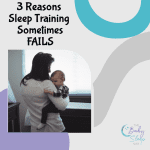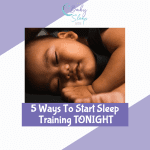
I LOVE fall. Pretty leaves! Hot cider! Chilly temps! Pumpkin-flavored EVERYTHING!! But I have to admit, there’s one thing I definitely don’t like about fall — the start of cold and flu season. And guess what? As much as we parents will try our hardest to prevent it, our babies and toddlers are probably going to come down with a few viruses this season, too. And this raises an important question. How will these inevitable illnesses affect our babies’ and toddlers’ sleep?
Fortunately for you, that’s exactly what we’re talking about today! So read on, parents, and find out what you can expect, sleep-wise, this cold and flu season.
2 Ways That Illness Will Likely Affect Your Baby or Toddler’s Sleep
Most parents find that illness affects their babies’ and toddlers’ sleep in these two ways:
- Your baby or toddler’s overall sleep amounts increase. This isn’t surprising, right? Illness affects us adults in the same way. And it’s no wonder! Fighting off infection is hard work! That’s why fatigue is a symptom of just about every illness there is. In fact, fatigue and fever (which is your body’s way of fighting illness) often go hand-in-hand. Here’s a little aside… Remember that fever itself is actually a sign that your child’s body is fighting infection. No need to necessarily treat the fever unless it gets too high, or your child seems to be in pain. Sometimes, it’s best to let the fever run its course without medication. When your baby or toddler comes down with a virus, don’t be surprised if she naps more than usual, or if she seems ready for bed quite early (or sleeps in quite late). This is perfectly normal. The best thing you can do is to let your baby or toddler sleep as much as she wants to. (I know. So tough, right?) Honestly, this is one of the upsides to your little one’s illness (if illness can have an upside). You will end up with a lot more downtime than you normally have! I usually use my kids’ sick days to get extra cuddles, catch up on chores, work ahead on my writing, and read as much as I can of whatever book I happen to be devouring at the moment. Of course, if your baby or toddler’s extra-sleepy state lasts for longer than you feel is normal (longer than, say, 5-7 days), or if you become at all concerned that something more serious than a simple cold or flu may be happening, don’t hesitate to contact a healthcare provider.
- Your baby or toddler may wake up more often than normal. Just when you thought it was all ‘more naps’ sunshine and ‘earlier bedtime’ roses, here comes the bad news. While it’s true that your baby or toddler will probably sleep more, overall, than he usually does, he will probably also wake more often than usual (particularly if he takes really long naps, or if he is sleeping through the night). For instance, a baby who normally sleeps through the night may wake a few times and need comfort. (This is especially true for stomach viruses. If your baby or toddler gets a stomach bug, prepare for some middle-of-the-night vomiting and/or diarrhea!) The same is true for naps. You might find that your normally-great napper takes shorter naps than usual, because he wakes from each nap early, out of discomfort. Instead of taking his usual long naps, your little one may take a series of shorter naps. Again, overall napping amounts will probably be greater, but you may not get those long stretches of sleep that you’re used to. I have found that my kids usually wake often at night, or wake early from naps, in the first 48 hours of an illness. After that, their symptoms (usually) calm down, and they start to gradually return to their normal sleeping habits.
Illness and Sleep Training: What Should You Do?
What if your little one falls ill in the midst of sleep training? What do you do then? Do you power through and keep coaching through the illness? Or do you ‘press pause’ and wait until your baby or toddler is healthy before resuming your sleep training?
Here’s our advice: if your baby or toddler is flat-out miserable, stop what you are doing, sleep-training wise, and focus on nursing your little one back to health. This may mean you end up taking a few steps back. You may need to rock/feed/swing to sleep again, for instance. But this is okay! It’s just a short-term solution to a short-term problem. But remember, to guard against short-term coddling becoming long-term sleep struggles, be sure you get back to your normal routine as soon as your baby or toddler is on the upswing. Wait too long, and it can feel like you’re starting all over with sleep training!
However, if your child is sick with a little sniffle, and seems to feel okay, you can continue on with your sleep training as normal. Basically, use your judgment, and treat your baby or toddler the way you would want to be treated in the same situation. Not many of us would drag ourselves into work if we were vomiting and had a 103 fever, right? So don’t ‘push through’ something like that with your little one! On the flip side, though, I’m sure all of us have gone on with our lives as normal when we had mild colds; your baby or toddler can probably do the same.
Sleep Training in Sickness and in Health!
Sleep “speed bumps” like illness, teething, and sleep regressions may slow down your sleep coaching progress, but they certainly don’t have to undo all of your sleep coaching progress! If you need more detailed tips on sleep coaching during illness without undoing everything, be sure to check out our exclusive article in our VIP Members Area. Or, if you are tired of reading, why not connect with one of our expert sleep consultants?








